Are your online competitors really who you think they are? You may be surprised by who is competing for your keywords in search – it’s not always as clear-cut as you think.
Focusing on organic competitors, this blog highlights how you can understand where the SEO competition lies.
Why is it important to find your online competitors?
There are so many reasons why it’s important to find out who your online competitors really are. It can help identify a variety of business prospects.
Uncover new business competition
The first thing to note is that often, your online competitors can be different to who you deem your offline business competitors to be. Strong digital investment from an otherwise hardly known or newer brand could have solidified them as a strong presence in Google that may come as a surprise to your business.
Identifying market trends and opportunities
By researching your competitors, you can gain insights into the latest market trends, consumer behaviours, and new opportunities to expand your business.
Benchmarking
Analysing your competitors’ online presence allows you to assess your strengths and weaknesses in relation to theirs. This will help you to develop a better marketing strategy and improve your brand image.
Identifying your unique selling proposition (USP)
By understanding your competitors’ offerings, you can identify gaps in the market that your business can fill. This will help you to develop a unique selling proposition that differentiates you from your competitors.
Improving customer satisfaction
You can identify areas where your business needs improvement by studying your competitors’ customer reviews and feedback. This will help you to improve your products, services, and customer experience to increase customer satisfaction.
Staying ahead of the competition
Monitoring your competitors’ online activities will enable you to anticipate their moves and respond quickly to changes in the market, helping you to stay ahead of the competition and remain relevant in the industry.
Understand your competitors’ organic strategies and react accordingly
Identifying the online competition is the first step in the competitor research process. By understanding what competitors are doing well, you can identify gaps in your strategy.
For example, you might see that some competitors have a successful blog full of useful informational content, whereas you lack those kinds of pages. Or, you might be on a par with them in terms of the sort of content you’re creating, but they could have massively higher domain authority than you thanks to investment in link building and digital PR.
Understanding who the competition is, is the first step in drilling down into their SEO strategies and identifying opportunities.
How can you find competitors?
1. Identify your target keywords
You won’t be able to identify your online competitors if you don’t know your own target keywords.
Carry out keyword research to identify your business’s primary target keywords and map these out to the URLs on your website. This can be done using both paid and free tools.
On the paid side, there’s tools such as SemRush and Ahrefs that are really useful in carrying out keyword research. And as for free tools, you can use features within Google itself such as People Also Ask and Related Searches, that are helpful for gaining inspiration.
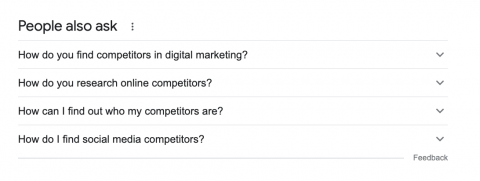
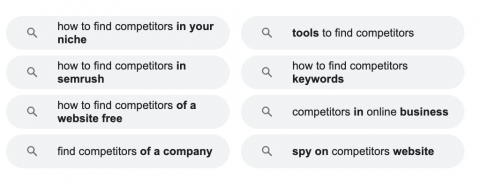
Google Search Console is also an invaluable resource to understand the queries people are using to access your website.
Once you have your target keywords in mind you can start working out who is competing for these terms.
2. Manually check google
With your list of target terms, add these into Google and have a look around. It’s a good idea to note in a spreadsheet the target term along with the top ranking competitors for that term, and then repeat for your core keywords. This obviously isn’t sensible to do on a large scale, but it can be useful if you just want a quick overview of the main organic competition.
Be sure to do this for target keywords for each of the core services or products your business provides, not just the ‘main’ keyword of your business. This is because the competitors in each area of your business might be different. For example, if we looked at who’s ranking for ‘digital marketing agency’ it would allow us to get a broad understanding of organic competitors. However, we’d also want to look at who’s ranking for each of the core services we offer, so would repeat the exercise for terms like ‘international seo agency’, ‘web development agency’ and ‘ppc agency’.
Although there may be some overlap, the websites ranking in Google for each of these terms are likely to be different.
3. Use the related: search operator
Search operators are a great tool for getting more detailed information straight from the Google search results. Using ‘related:’ will allow you to see similar sites to a domain. It’s did a fairly good job in the case of hallaminternet.com:
 Although as you can see, it’s brought up four competitors, which is not a hugely exhaustive list.
Although as you can see, it’s brought up four competitors, which is not a hugely exhaustive list.
It’s usefulness also seems to vary, with some powerhouse domains returning no results: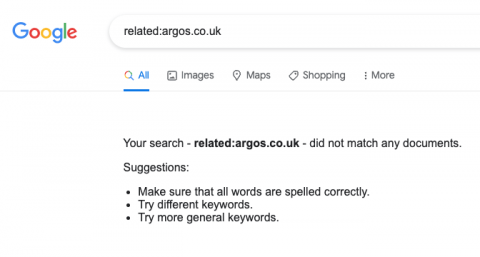 Still, it’s worth a shot! Give it a go and see if your domain returns any results – it could be useful in helping you identify further competitors you might not have considered.
Still, it’s worth a shot! Give it a go and see if your domain returns any results – it could be useful in helping you identify further competitors you might not have considered.
4. Use paid tools
An optional one, but if you have access to them, paid tools are a great way of finding your online competition and speeding up the process.
Typing a domain into Semrush and using the Competitors tab within the Organic Research section gives a quick overview of a domain’s competitors. This is measured in terms of the number of ranking keywords and the number of common keywords between your domain and competing domains – if there’s a large number of common terms then they’re considered competing domains.
It also provides estimated monthly traffic – I’d emphasise the estimated here, but it can be a useful gauge in understanding different levels of competition from different domains.
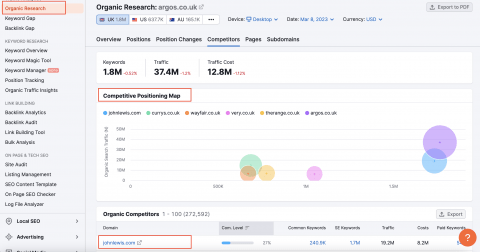 With competitors identified, you could then use this information and further tools within Semrush to carry out a keyword gap analysis – identifying keywords that competitors rank for but you don’t, or where competitors are ranking higher than you for the same keyword. This information should factor into your SEO strategy.
With competitors identified, you could then use this information and further tools within Semrush to carry out a keyword gap analysis – identifying keywords that competitors rank for but you don’t, or where competitors are ranking higher than you for the same keyword. This information should factor into your SEO strategy.
Ahrefs does a similar thing, too – check out the Organic Competitors section within the Organic Search sidebar and you’ll see similar useful keyword overlap, traffic estimate and other data: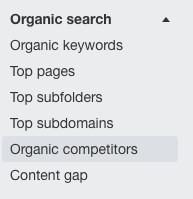
5. Understand the type of content that is ranking
This is a crucial and often overlooked part of the SEO process. You might have identified your target keywords and started to identify which domains are competing, but you shouldn’t stop there. Look closely at the search intent and type of pages ranking for that term, too.
For example, the term ‘content management software’ sees a Google results page consisting of review sites and informational pages all targeting ‘what is a content management system’. If we were hoping to rank our content management system product page for this query, we’d think twice after looking at these SERPs, as that page seemingly doesn’t match with Google’s understanding of the user’s search intent.
With your target keywords in mind, assess the search intent of those queries by looking at the URLs that are ranking – are they informational, transactional, navigational or commercial? Ensure that the page you want to get ranking for that term matches that intent, otherwise, you’ll be fighting an uphill battle.
To conclude
A quick summary of key points to remember:
- It’s important to find your online competitors as they’re not necessarily going to be who you expect.
- Identifying your organic competitors is the first stage in the competitor research process, allowing you to dig into what is and isn’t working in their SEO strategies.
- Firstly, it’s essential that you understand your website’s target keywords; check these in Google to gain an understanding of which domains you’re competing with.
- Supplement this with paid tools if you can. These might highlight further competitors you hadn’t been aware of and allow you to take this research to the next level by digging into the keyword overlap and opportunity in more detail.
- Understanding who is ranking is just the beginning – make sure you’re also clear on the types of pages these websites have ranking. Make sure you give searchers – and Google – what they want by ensuring your page matches the correct search intent.
If you have any further questions or need some more advice, please don’t hesitate to get in touch.









